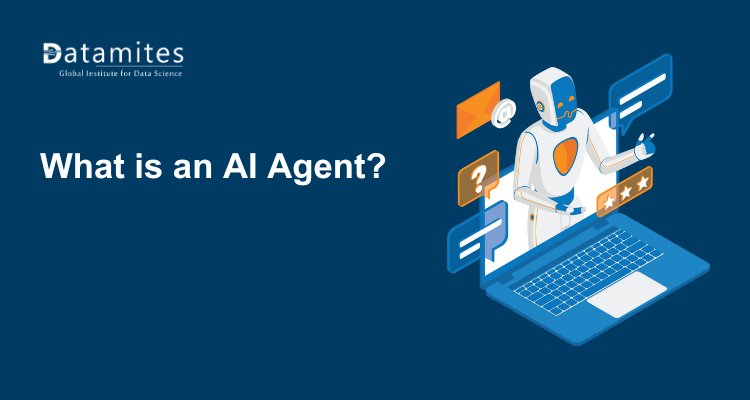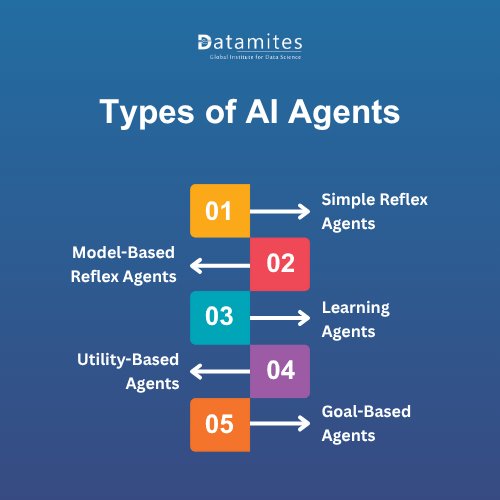What is an AI Agent? Guide to Intelligent Agents in AI
An AI agent is a system capable of perceiving its environment, making decisions, and taking actions to achieve specific goals.

Artificial Intelligence (AI) is revolutionizing the way machines interact with the world, and at the heart of this revolution lies the concept of AI agents. These intelligent systems are designed to perceive, reason, and act autonomously, making decisions that mimic human thinking. Whether it’s powering self-driving cars or managing virtual assistants, AI agents play a crucial role in enabling machines to operate intelligently. This guide explores what AI agents are, how they function, their different types, applications, benefits, and the challenges they present.
What is an AI Agent?
An AI agent is an autonomous entity in artificial intelligence that perceives its environment through sensors and acts upon that environment using actuators based on its goals and experiences. In simple terms, it is a system that takes input, processes information, and produces an intelligent output. These agents are designed to perform tasks that typically require human intelligence, such as learning, decision-making, and problem-solving.
AI agents are increasingly integral to Fortune 500 companies, particularly in domains like customer support and recommendation engines. In the realm of artificial intelligence, an agent can vary from a simple rule-based system to advanced models that learn and adapt over time. These agents serve as the backbone of many modern intelligent systems and are pivotal in fields such as robotics, natural language processing, and game development.
Refer these below articles:
- Hyperparameter Tuning: How to Improve Your Machine Learning Model
- What Is a Neural Network? Understanding Deep Learning Basics
- How to Build Your First Machine Learning Model?
How Do AI Agents Work?
AI agents operate by perceiving their environment, processing information, making decisions, and taking actions to achieve specific goals. Their functionality is driven by a continuous interaction between inputs (from the environment) and outputs (actions taken). Let’s break down the key components and working process:
1. Perception (Sensing the Environment)
AI agents begin by collecting data from their environment using sensors or input interfaces. These sensors can vary depending on the application:
- Robots use cameras, microphones, or LIDAR.
- Chatbots receive text input from users.
- Autonomous vehicles collect data from radar, GPS, and cameras.
2. Processing (Understanding and Analyzing)
Once the percept is gathered, the AI agent processes it using algorithms that could involve:
- Machine Learning Models
- Rule-based Systems
- Neural Networks
- Natural Language Processing (NLP)
3. Decision-Making (Choosing the Best Action)
AI agents evaluate different possible actions based on:
- Predefined goals
- Utility functions (to maximize rewards)
- Policies (learned strategies from reinforcement learning)
- Rules and logic (in simple systems)
4. Action (Interacting with the Environment)
After making a decision, the AI agent takes an action via effectors:
- Physical actions in robots (e.g., moving an arm)
- Textual responses in chatbots
- Control signals in smart systems
5. Learning (Improving Over Time)
Modern AI agents often use learning mechanisms to improve their performance:
- Supervised learning (from labeled data)
- Unsupervised learning (finding patterns)
- Reinforcement learning (learning from feedback)
Example: AI Agent in Self-Driving Car
AI agents in self-driving cars use perception, prediction, and decision-making algorithms to handle traffic. Examples include Tesla Autopilot, Waymo, and Cruise, each applying unique AI methods for autonomy. The AI agents market is estimated to be valued at $7.38 billion and will continue to grow at a compound annual growth rate of 44.8% and reach $47.1 billion by 2030 (Markets and Markets)
- Perception: Detects traffic signs, pedestrians, and road lanes using cameras and sensors.
- Processing: Interprets the scene using computer vision.
- Decision: Decides to slow down or stop.
- Action: Controls the brake system.
- Learning: Adjusts future behavior based on outcomes and data.
Types of AI Agents
AI agents are categorized based on their level of complexity and capabilities. The primary types include:
- Simple Reflex Agents: These agents respond to specific stimuli with predefined rules. They do not have memory or learning capabilities. Example: Thermostat that turns off heating when a set temperature is reached.
- Model-Based Reflex Agents: These agents maintain an internal model of the world to make more informed decisions. They consider historical data along with current inputs.
- Goal-Based Agents: These agents act to achieve specific goals. They evaluate possible actions based on their effectiveness in reaching a desired outcome.
- Utility-Based Agents: These agents aim to maximize their “utility” or satisfaction level. They not only pursue goals but also evaluate the quality of outcomes to choose the best option.
- Learning Agents: These agents improve their performance over time through machine learning techniques. They adapt their behavior based on feedback and new experiences.

Real-World Applications of AI Agents
AI agents are being applied across diverse sectors to improve efficiency, enhance user experience, and automate tasks. Some notable applications include:
- Virtual Assistants: Tools like Siri, Alexa, and Google Assistant rely on AI agents to understand and respond to user commands.
- Autonomous Vehicles: Self-driving cars use AI agents to interpret surroundings, make decisions, and navigate safely.
- Healthcare: AI agents assist in diagnostics, treatment planning, and personalized medicine.
- Customer Support: AI chatbots and virtual agents handle customer inquiries, reducing response times and improving satisfaction.
- Finance: Intelligent agents in fintech monitor market trends, execute trades, and detect fraudulent activities.
AI agents are transforming industries like healthcare, finance, retail, and manufacturing by boosting efficiency and personalization. Popular tools like ChatGPT, Google Assistant, and IBM Watson showcase their versatility. With rapid advances in NLP, machine learning, and IoT, the AI agent market is projected to hit $47.1 billion by 2030.
Read these below articles:
Benefits and Challenges of Using AI Agents
AI agents are transforming industries by automating tasks, improving efficiency, and enabling smart decision-making. While their benefits are vast, they also bring challenges like data reliance, ethical concerns, and complex development.
Benefits of AI Agents:
- Efficiency: AI agents can process large volumes of data quickly and accurately.
- Automation: They automate routine tasks, freeing up human resources for strategic activities.
- Scalability: AI agents can operate 24/7 and handle multiple users or tasks simultaneously.
- Adaptability: Learning agents can adapt to changing environments and improve over time.
Challenges of AI Agents:
- Complexity: Designing intelligent agents that understand and adapt to complex environments is challenging.
- Ethical Concerns: Decisions made by AI agents can raise ethical questions, especially in areas like surveillance or military applications.
- Data Dependency: The performance of AI agents is heavily reliant on the quality and quantity of data.
- Security Risks: Malfunctioning or compromised agents can pose serious risks in critical systems.
AI agents are at the forefront of technological innovation, shaping how machines interact with the world. From basic rule-based systems to advanced learning models, they power a wide range of applications across industries and daily life. Topics like these are a key part of any comprehensive artificial intelligence course in hyderabad, helping students understand and build intelligent systems for real-world use.
DataMites Artificial Intelligence Institute in Pune offers a strong foundation for those aiming to build a career in AI. With expert-led instruction, hands-on projects, and dedicated placement support, Datamites goes beyond theory to equip learners with practical skills and confidence. The program is accredited by renowned organizations such as IABAC and NASSCOM FutureSkills, adding industry recognition to your credentials.
